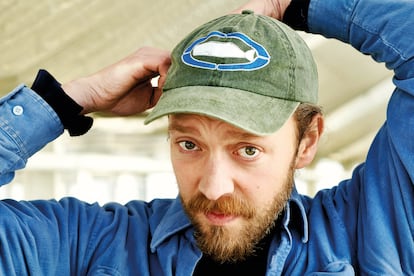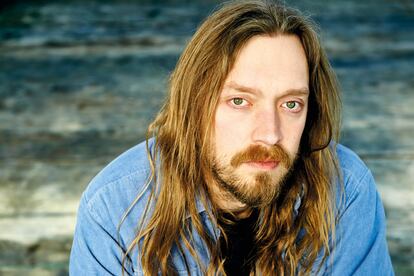Depression, crime and gore: The dregs of the dark web come to the surface
Philipp Winkler, the German writer who became a literary phenomenon for his novel ‘Hooligan,’ delves into the darkest corners of the internet in his second book, ‘Creep’


There are parts of the year and a half it took him to finish his second novel, Creep, that Philipp Winkler is unable to remember. “I had fallen into a depression, and writing the book probably didn’t help,” he recalls. “The story it tells is very dark.” On this day in early May, it was a bright morning in Hanover, the nearest city to his home in the countryside, where he lives with his partner and their rescued dog. But back in 2020, in the middle of the pandemic lockdown, the sun — at least in a metaphorical sense — was not shining brightly enough. “I didn’t realize it at first, but the lockdown played an important role,” he notes with a reflective cadence. “The derisory support given to artists made me realize that Germany sees itself as a country of thinkers and innovation. But in reality, people still have Goethe and Schiller as references, figures who are long gone. Besides, why should I get a job on the side so I can afford to write, if that’s already a job? That idea blows my mind.”
In contemporary Germany, his name came to the forefront in 2016 with the publication of his debut, Hooligan (published in the U.S. by Arcade in 2018), a story he began while studying creative writing in college. It ended up being an unexpected commercial success for which he made a theatrical adaptation and is now preparing another for film. In that book, he descended into the sordid world of violence among soccer fans, while in Creep he once again slips into an abyss just as dark or even darker: one that opens in the depths of the dark web, a virtual underground where drug dealers, hitmen, pornographers and all kinds of shady businessmen rub shoulders.
“I could have written about social media, about Twitter and Instagram, which I think are even more dangerous than what I describe in my book. It’s a totally different beast,” the writer says, sitting on a secluded terrace, his attire black, his blond hair in a ponytail and blue tattoos peeking out at his hands and neck. “But if I decided not to write about people who become addicted to social media, it’s because I feel closer to people who consume gore videos than to Instagram influencers. Personally, I hate all that. People do not realize the damage that networks have done to society, and that is no secret either. There are a lot of Silicon Valley workers talking about it in TED talks and things like that.”
In Creep — which was published in Germany after his novella, Carnival — Winkler recreates two stories that, despite having a multitude of common connections, never intertwine. Perhaps because its two protagonists live in isolation from the world in such a way that is both radical and devastating, or maybe because their connection is the internet itself; a network that supposedly binds us all together with an invisible knot. Fanni lives in Germany and works for a surveillance company. The family she spies on through security cameras is the closest thing she has to a human bond, though it’s hard to gauge how hardened her emotions are after years of consuming videos peppered with summary executions, brutal accidents and dismembered bodies — all real. In Japan, Junya is a hikikomori, one of the hundreds of thousands of people around the world who decide to confine themselves indefinitely to a room, imprisoned by choice in their bubble of solitude. Cruelly bullied at school, he now spends his days wandering through shady forums in which he finds instructions on how to commit crimes armed with a hammer and a mask. In the draft of Creep, there was to be a third U.S.-based character who was eventually left out, although Winkler believes the book “works well” without him. Neglected by those close to them, lacking all warmth, Fanni and Junya have disconnected their lives from tangible reality to a point of no return.

Set in the desolate landscape of hypermodernity, Creep’s backdrop does not stint in reviewing a litany of psychological pain: the incurable wounds of an unhappy childhood, the hunger for affection and the thirst for belonging, the tapping of white canes in search of a reason to live. Seeing the spiral of despair that is unleashed in the pages of the book, it is not surprising that his writing ended up affecting the author. “I think I’ve actually had depression all my life, I just didn’t realize what it was. I come from a working-class family, where you don’t talk about things like depression,” Winkler confesses. As a writer who did not grow up among books, but with the noise of the television on all the time, he is now taking advantage of the influence that the audiovisual media has had on him to write the screenplay for the movie based on Hooligan. “Working for film is a nice distraction from literature, where there are a lot of people with huge egos, and I don’t exclude myself,” he notes. “But you can either have a huge ego and treat people well, or behave like an asshole for no reason.”
To recreate the stories that thrive in the most inaccessible corners of the web, the writer documented himself visiting pages and forums, although he already had some references. “I grew up with rotten.com, the site where ‘splatter gore’ [extremely graphic and violent gore] websites come from, so I already knew that world,” he says. “But to prepare the book I spent a lot of time talking to people in gore subreddits [categories within Reddit.com], and I also contacted hikikomori from places like Brazil, not Japan, because they use other websites there,” he explains. “Both the hikikomori and the people who participate in the depersonalization subreddits are real people with real problems, so I didn’t want to use their stories for the benefit of my book. Although, of course, they were a source of inspiration.” Reading how Fanni mechanically consumes images of ultraviolence that end up being reproduced in a loop in her head, it is inevitable to wonder about the reason for this impulse. The writer posed that question on the net, and while not everyone was able to verbalize a justification, he was met with a repeated response: “I was often told that it reminds them how precious life is, their life, and how it can end in an instant.”
The fact that Fanni is a woman in a subculture where men abound is striking. Even more so considering that Winkler’s previous novel, Hooligan, also takes place in a testosterone-laden environment. “I wanted to try to create a female protagonist, because I had never done it before, and I think I was especially respectful of the fact that I am a cis man and not a woman,” the author says. “I don’t exactly bring a female perspective, because there is no perspective from the self in the book, but I think the narrator’s language is very close to who Fanni and Junya are. It’s colored by how they see themselves.”
Another noteworthy issue regarding the style of the novel is the use of a multitude of terms in Japanese to represent the universe in which Junya moves and others in English related to technology to recreate Fanni’s world. This is an ambivalent decision that on the one hand is enormously relevant to reflect how people speak not only in internet slang, but also increasingly in everyday life, and on the other hand poses a challenge when it comes to reading the novel. “It’s funny, because some people tell me they had a hard time getting into the book because of this issue, and others say no one talks like that, but I asked two people who work in the industry, and they assured me that people talk like that all the time.”
While he finishes off his coffee and another rolling cigarette on a terrace near the center of Hanover, Winkler summarizes the various projects that are currently keeping him busy. In addition to the adaptation of Hooligan, he is working on a second screenplay that was originally going to be based on Carnival, his novella, but has ended up becoming an original story. In addition, he is going to start “seriously” writing a future book, which treats Richard Ford’s complete collection of short stories as a source of inspiration. “I read it because my agent thought it would be useful,” he says. “But now I’m reading the Aubrey-Maturin series, by Patrick O’Brian, which is 21 books about sailors and naval battles set in the Napoleonic Wars. I like it. It is totally different from what I have read. It is very authentic and fantastically documented, although it is also quite racist and sexist, because those were different times. But I truly believe it’s different from what you can find in literature today, even though old white men are still writing,” he laughs. And it dawns on him, “What’s more, one day I’ll be an old white man too.”
Sign up for our weekly newsletter to get more English-language news coverage from EL PAÍS USA Edition
Tu suscripción se está usando en otro dispositivo
¿Quieres añadir otro usuario a tu suscripción?
Si continúas leyendo en este dispositivo, no se podrá leer en el otro.
FlechaTu suscripción se está usando en otro dispositivo y solo puedes acceder a EL PAÍS desde un dispositivo a la vez.
Si quieres compartir tu cuenta, cambia tu suscripción a la modalidad Premium, así podrás añadir otro usuario. Cada uno accederá con su propia cuenta de email, lo que os permitirá personalizar vuestra experiencia en EL PAÍS.
¿Tienes una suscripción de empresa? Accede aquí para contratar más cuentas.
En el caso de no saber quién está usando tu cuenta, te recomendamos cambiar tu contraseña aquí.
Si decides continuar compartiendo tu cuenta, este mensaje se mostrará en tu dispositivo y en el de la otra persona que está usando tu cuenta de forma indefinida, afectando a tu experiencia de lectura. Puedes consultar aquí los términos y condiciones de la suscripción digital.








































